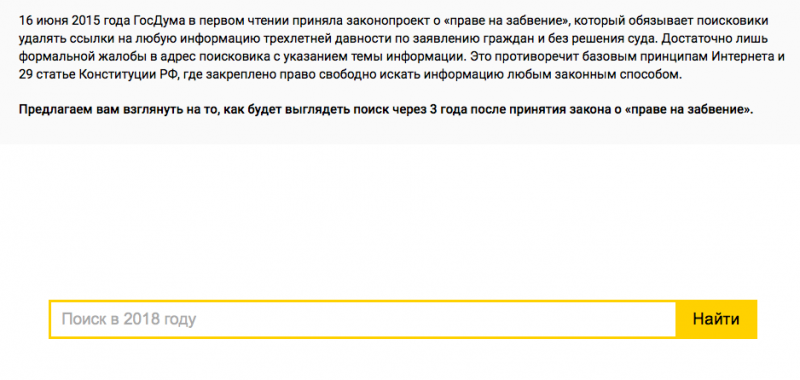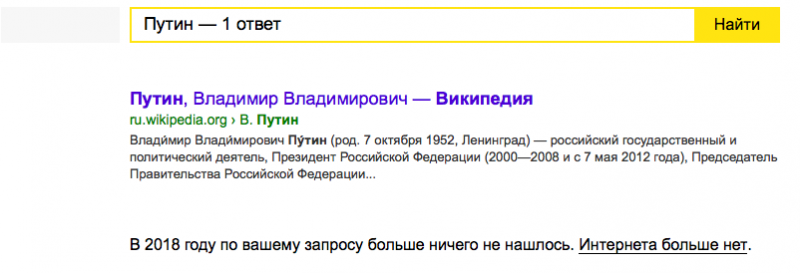
Search results on the RuNet might dry up as a result of new “right to be forgotten” law. Images mixed by Tetyana Lokot.
A new website created by Russian advertizing executives asks you to imagine what search engines in the RuNet could look like in 2018—if the “right to be forgotten” bill becomes law.
The website, zabvenie.com (“oblivion”) simulates a simple search engine front page that looks suspiciously like Yandex, Russia's main search company.

Front page of the “Oblivion” (zabvenie.com) website.
On June 16, 2015 State Duma passed in first reading a draft bill about the “right to be forgotten,” which obligates search engines to delete links to any information that is over three years old, based on citizens’ requests and without court orders. A formal complaint addressed to the search engine and mentioning the topic of the information is enough. This violates the basic principles of the Internet and Article 29 of the Russian Constitution, which guarantees the right to search for information freely using any lawful means.
We invite you to take a look at what search could look like three years after the “right to be forgotten” law is passed.
“Oblivion” allows you to search for any term, but gives you zero information in return for all search queries but one—the last name of Russia's president, Vladimir Putin (in Russian). The only result for this search is his Russian Wikipedia entry. The rest of the searches generate the following message: “In 2018 no results were found for your query. There is no more Internet.”

Only one search query—”Путин” (Putin)—produces any results, and even then, only returns one link.
The creators of zabvenie.com, Vyacheslav Smirnov and Vladislav Arbatov, told TJournal they don't hope to change the bill in any fundamental way, but rather seek to show how dangerous it could be if it becomes law.
Сайт призван продемонстрировать, что там в принципе ничего нет в поиске. Речь не о цензуре ни в коем случае, а о том, что из себя будет представлять ландшафт поисковых результатов с этим законом (точнее, пока ещё законопроектом).
С другой стороны, речь вполне может пойти и о цензуре, но пока рано об этом говорить, так как непонятно, как процедура будет работать на практике.
The website is meant to show that there is nothing there, in the search results. We're not talking about censorship, no, but about what the search results landscape will look like with this law (draft bill for now).
On the other hand, we may well see censorship, but it's still too early to talk about this, since it's unclear how this procedure will work in practice.
The website was launched to mark the passing of the draft of the law in first reading: only one lawmaker voted against the initiative, with 423 in favor. To become law, the draft needs to pass two more readings in the State Duma, be approved by the Federation Council and signed by the President. If that happens, the law will come into force on January 1, 2016.
Internet industry representatives in Russia have spoken out against the law, calling it unconstitutional and claiming it limited Russians’ right to access information. According to Russian media reports, after representatives of Yandex and Russian Association of Electronic Communications met with Duma MPs, lawmakers agreed to remove a controversial component of the legislation's first draft that would have allowed individuals to force search engines to delete links to any personal information that is more than three years old—even without evidence that the information is inaccurate or false.



